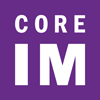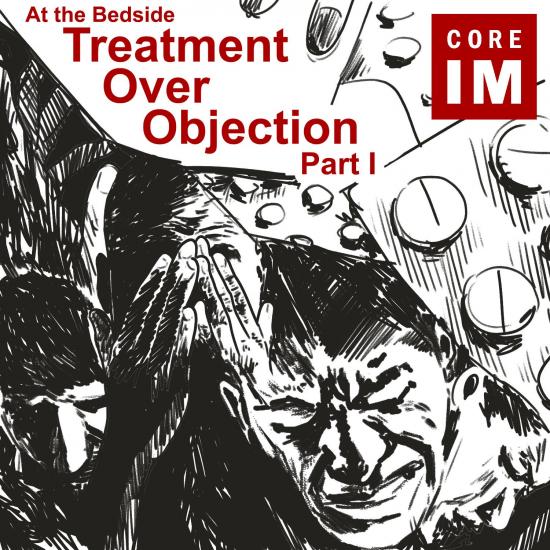Core IM
Internal medicine training typically does not include education on how to approach situations where a patient without decisional capacity is refusing a recommended medical treatment. These are uncommon but ethically challenging cases. Additionally, these situations can bring about considerable moral distress in clinicians who are uncertain how to best proceed. In this episode of Core IM, the team will discuss this scenario and others to offer a better understanding of At the Bedside: Treatment Over Objection.
First, listen to the podcast. After listening, ACP members can take the CME/MOC quiz for free.
CME/MOC:
Up to 0.5
AMA PRA Category 1 Credits ™ and MOC Points
Expires December 08, 2024
active
Cost:
Free to Members
Format:
Podcasts and Audio Content
Product:
Core IM
Welcome to Core IM, a virtual medical community! Core IM strives to empower its colleagues of all levels and backgrounds with clinically applicable information as well as inspire curiosity and critical thinking. Core IM promotes its mission through podcasts and other multimodal dialogues. ACP has teamed up with Core IM to offer continuing medical education, available exclusively to ACP members by completing the CME/MOC quiz.

- Ethical and emotional challenges of treatment over objection
- Autonomy
- Beneficence
- Non-maleficence
- Paternalism
- Dignity
- 7 Question Framework
- What is the likely severity of harm without intervention?
- How imminent is harm without intervention?
- What is the efficacy of the proposed intervention?
- What are the risks of the intervention?
- What is the likely emotional effect of a coerced intervention on the patient?
- What is the patient’s reason for refusal?
- What are the logistics of treating over objection?
- Study of the 7 questions
- Retrospective analysis of 35 consecutive ethics consultations at Columbia University Medical Center
- A recommendation to proceed with treatment over objection was made in 63% of cases
- Two questions were found to be significantly associated with the final ethics recommendation:
- Imminence of harm was found to have a likelihood ratio of 5.57 (p = 0.045), suggesting that when harm is imminent, the ethics consultant was more likely to recommend proceeding with treatment over objection
- Logistical issues had a likelihood ratio of 0.01 (p = 0.002), suggesting that when there are many logistical issues, the ethics consultant was less likely to recommend proceeding with treatment over objection.
- While these two questions had the most weight, the authors stress that it is still important to consider all seven questions for each patient.
Contributors
Shreya Trivedi, MD - Editor, Host
Martin Fried, MD - Editor, Host
Jafar Al-Mondhiry, MD - Producer
Margot Hedlin, MD - Producer
Tamar Schiff, MD - Producer
Kenneth Prager, MD - Expert Interviewee
Reviewers
David Alfandre, MD
Andrea Kondracke, MD
Those named above unless otherwise indicated have relevant financial relationship(s) to disclose with ineligible companies whose primary business is producing, marketing, selling, re-selling, or distributing healthcare products used by or on patients.
Release Date: December 8, 2021
Expiration Date: December 8, 2024
CME Credit
This activity has been planned and implemented in accordance with the accreditation requirements and policies of the Accreditation Council for Continuing Medical Education (ACCME) through the joint providership of the American College of Physicians and the Core IM. The American College of Physicians is accredited by the ACCME to provide continuing medical education for physicians.
The American College of Physicians designates each enduring material (podcast) for .5 AMA PRA Category 1 Credit™. Physicians should claim only the credit commensurate with the extent of their participation in the activity.
ABIM Maintenance of Certification (MOC) Points
Successful completion of this CME activity, which includes participation in the evaluation component, enables the participant to earn up to .5 medical knowledge MOC Point in the American Board of Internal Medicine’s (ABIM) Maintenance of Certification (MOC) program. Participants will earn MOC points equivalent to the amount of CME credits claimed for the activity. It is the CME activity provider’s responsibility to submit participant completion information to ACCME for the purpose of granting ABIM MOC credit.
How to Claim CME Credit and MOC Points
After listening to the podcast, complete a brief multiple-choice question quiz. To claim CME credit and MOC points you must achieve a minimum passing score of 66%. You may take the quiz multiple times to achieve a passing score.


